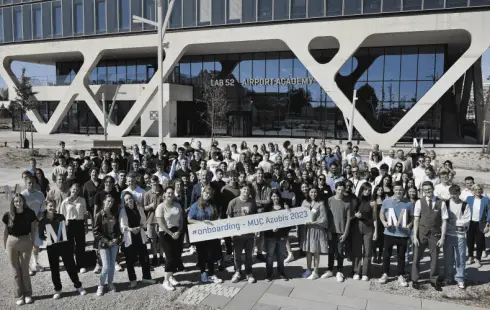
Custom T-Shirts: Last-Minute Gifts They'll Actually Love
Section: Arts
 Munich Airport is gearing up for the next generation of talent as 113 apprentices and dual students embark on their careers at the bustling aviation hub. This new cohort, representing various fields of expertise, will contribute their skills and knowledge to the airport's diverse workforce.
Munich Airport is gearing up for the next generation of talent as 113 apprentices and dual students embark on their careers at the bustling aviation hub. This new cohort, representing various fields of expertise, will contribute their skills and knowledge to the airport's diverse workforce.
With the arrival of these 113 apprentices and dual students, Munich Airport now boasts a total of 260 young individuals pursuing professional development through apprenticeships and dual studies in more than 20 different vocations and academic programs within the FMG Group. The spectrum of specialties encompasses IT, technology, security and safety, gastronomy, retail, logistics, and business administration.
The newcomers received a warm welcome from Jan-Henrik Andersson, Managing Director of Commercial and Security, Caroline Kaindl, Head of Personnel Development and Group Training, and Gerhard Holuba, Training Manager. These apprentices successfully emerged from a competitive pool of approximately 1,000 applicants, and they are now poised to embark on a high-quality training journey. Munich Airport's commitment to nurturing young talent has been consistently acknowledged in nationwide assessments. In surveys conducted by the magazine Focus Money, the FMG Group has repeatedly earned recognition as one of "Germany's Best Training Companies" in the transportation and logistics sector.
For those aspiring to commence their professional journey at Munich Airport in the coming year, applications are currently open and can be submitted online through the FMG website and its subsidiary companies at www.munich-airport.de/ausbildung.
Munich Airport remains committed to fostering talent and nurturing the next generation of professionals who will contribute to the continued success and growth of the airport and the broader aviation industry.
Apprentice and dual student are two distinct pathways for individuals to gain practical experience and training in a specific field, but they differ in several key ways:
Education Structure:
Apprenticeship: Apprenticeships typically follow a more traditional vocational training model. Apprentices combine on-the-job training with classroom-based learning. They spend a significant portion of their time working under the guidance of experienced professionals while attending technical schools or training centers to acquire theoretical knowledge related to their chosen trade or profession.
Dual Study Program: Dual students, on the other hand, are enrolled in a formal higher education program, such as a bachelor's degree, alongside their practical training. This means they simultaneously pursue a university or college education while working in a related field. The academic coursework is integrated with the work experience, creating a synergy between theory and practice.
Educational Level:
Apprenticeship: Apprenticeships are often associated with vocational or trade careers. They are typically available for roles in skilled trades, such as electricians, plumbers, carpenters, and mechanics, as well as some white-collar professions like healthcare, culinary arts, and information technology.
Dual Study Program: Dual study programs are generally designed for individuals seeking a higher level of education, typically at the undergraduate level. Dual students pursue degrees in a wide range of fields, including engineering, business, IT, and more.
Duration:
Apprenticeship: The duration of an apprenticeship varies depending on the profession and country but typically lasts between two to four years. The length is often determined by the complexity of the skills and knowledge required for the chosen occupation.
Dual Study Program: Dual study programs usually span the standard duration of the academic degree being pursued, such as three to four years for a bachelor's degree. The balance between work and study can vary, with students typically spending alternating periods in the classroom and the workplace.
Outcome:
Apprenticeship: Upon completing an apprenticeship, individuals typically receive a recognized certification or journeyman status in their chosen trade or profession. This certification allows them to practice their craft independently.
Dual Study Program: Dual students earn an academic degree (e.g., bachelor's degree) in addition to gaining practical experience. This degree opens up a broader range of career opportunities, including roles that require higher education qualifications.
Target Careers:
Apprenticeship: Apprenticeships are well-suited for those interested in hands-on, practical careers where specialized skills are crucial, such as in the construction, manufacturing, and service industries.
Dual Study Program: Dual study programs are ideal for individuals who want to combine academic knowledge with practical experience and are often chosen by those pursuing careers in fields like engineering, business management, information technology, and finance.
In summary, apprenticeships emphasize hands-on training and typically lead to a vocational qualification, while dual study programs combine academic education with practical experience and result in a formal degree. The choice between the two depends on an individual's career goals, educational preferences, and the specific requirements of their chosen profession.
Image copyright Flughafen Muenchen GmbH

Section: Arts

Section: Arts

Section: Business

Section: Business

Section: Arts

Section: Health

Section: Arts

Section: News

Section: News

Section: Arts
Health Insurance in Germany is compulsory and sometimes complicated, not to mention expensive. As an expat, you are required to navigate this landscape within weeks of arriving, so check our FAQ on PKV. For our guide on resources and access to agents who can give you a competitive quote, try our PKV Cost comparison tool.
Germany is famous for its medical expertise and extensive number of hospitals and clinics. See this comprehensive directory of hospitals and clinics across the country, complete with links to their websites, addresses, contact info, and specializations/services.
One of the most beautiful squares transforms into a summer stage every year for two days. The Gärtnerplatz Open-Air features a free music and cultural program across three stages, as well as street food from local vendors. On Saturday, the main stage at Gärtnerplatz offers something for everyone,...



No comments yet. Be the first to comment!